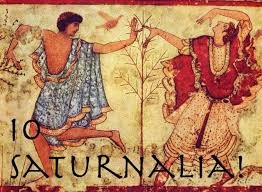Introduction
Every year, millions of Christians worldwide celebrate the birth of Jesus Christ on December 25. It’s a day marked by joy, festivities, and the retelling of the nativity story. But let’s pause for a moment and ask the hard question: was Christ actually born on December 25? The answer, backed by historical and biblical evidence, is no. December 25 is not the true date of Christ’s birth—it’s a date rooted in pagan history that was later repurposed by the Church.
If this shocks you, don’t worry. It’s not about debunking Christmas but about understanding its origins and refocusing our hearts on the true essence of Christ’s coming.
1. The Pagan Roots of December 25
Before it became "Christmas Day," December 25 was associated with pagan festivals like Saturnalia, celebrated by the Romans to honor Saturn, the god of agriculture. This festival involved feasting, gift-giving, and unrestrained partying. Similarly, the Winter Solstice was celebrated as the "rebirth of the sun," symbolizing longer days ahead.
So why did the Church adopt December 25 for celebrating Christ? In the 4th century, under Emperor Constantine, the early Church strategically chose this date to shift the focus from pagan rituals to Christ, the true "Sun of Righteousness" (Malachi 4:2). It wasn’t about deception but about redemption—transforming a day once dedicated to idols into a day to glorify God.

2. What the Bible Says About Christ’s Birth
The Bible doesn’t give a specific date for Christ’s birth. In fact, details in Scripture suggest He wasn’t born in December. Luke 2:8 mentions that shepherds were out in the fields watching their flocks by night when the angel announced Jesus’s birth. This would likely have been during warmer months, not the cold winter season.
What matters more than the date is the reason for His birth. John 1:14 tells us:
"The Word became flesh and made his dwelling among us."
This is the heart of the story: God stepped into humanity to save us from sin. Matthew 1:21 emphasizes this:
"She will give birth to a son, and you are to give him the name Jesus, because he will save his people from their sins."
Whether Jesus was born in December, April, or September, the focus is His mission to redeem mankind.
3. Why December 25?
The choice of December 25 was not about accuracy but about opportunity. The Church understood that completely abolishing popular pagan festivals would alienate people. Instead, they repurposed the date to reflect Christ’s birth, effectively "redeeming" the day. By doing so, they pointed people away from the worship of false gods and toward the worship of the true God.
Romans 12:2 perfectly captures this transformation:
"Do not conform to the pattern of this world, but be transformed by the renewing of your mind."
The early Church used December 25 as a tool to bring people to Christ, making it a day of light rather than darkness.
4. The Danger of Losing Focus
Today, many Christians celebrate December 25 without questioning its origins or purpose. Worse still, the day has become heavily commercialized, with more emphasis on materialism than on Christ. It’s time to refocus. December 25 should not be about gifts, decorations, or parties—it should be about the message of Christ.
Isaiah 9:6 reminds us:
"For to us a child is born, to us a son is given, and the government will be on his shoulders. And he will be called Wonderful Counselor, Mighty God, Everlasting Father, Prince of Peace."
The celebration should point to Jesus, the Savior of the world, and His gift of salvation.
5. What Should We Do as Christians?
Here are practical steps to ensure we keep Christ at the center of the season:
- Reflect on God’s Love: Meditate on John 3:16, the ultimate reminder of why Christ came to earth.
- Evangelize: Use this season to share the Gospel with friends, family, and neighbors.
- Practice Generosity: Reach out to the less privileged, embodying Christ’s love through acts of kindness (Matthew 25:40).
- Focus on Worship: Spend time in prayer, gratitude, and worship, celebrating the birth of the King of Kings.
The date is secondary; the mission of Christ is what truly matters.

Conclusion
Christ was never born on December 25th, and that’s okay. The significance of the day lies in the opportunity it gives us to reflect on God’s love and the gift of salvation through Jesus Christ. Instead of debating the date or its pagan roots, let’s use this time to honor Christ and live out His message.
Let’s make December 25 not just a day of celebration but a day of transformation. After all, it’s not about the history of the date—it’s about the eternal truth of the Savior’s birth.

